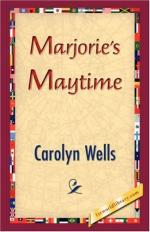As Cousin Ethel had told them, they had no trouble at all in disposing of their wares. Marjorie concluded that half the population of Cambridge must be small children, so eager did the ladies seem to buy dolls.
At many of the houses they were cordially invited to come in and partake of some refreshment, for the whole town seemed bent on entertaining the peddlers. But the Maynard children preferred not to accept these invitations, as they were not well enough acquainted, and as for Bertha Baker, when she was invited in to a house, she would reply bluntly, “No, I don’t want to go in.”
Midget and King looked at her in astonishment, for they were not accustomed to hear children talk like that.
When the cart full of dolls had been about half sold, the children saw a little girl coming toward them with an empty express wagon.
“Hello, Bertha,” she said, “what are you selling?”
“Dolls,” said Bertha, shortly, and the Maynard children waited, expecting that Bertha would introduce the stranger.
But Bertha didn’t, and only said, “Come on,” to her own companions, and started on herself.
“Wait a minute,” said King, who was growing rather tired of Bertha’s company, and was glad to meet somebody else. “I say, Bertha, introduce us to your friend.”
“She’s Elsie Harland,” said Bertha, ungraciously, and evidently unwillingly.
But King took no notice of Bertha’s unpleasant manner. “How do you do, Elsie?” he said, in his frank, boyish fashion. “This is my sister, Marjorie, and I am Kingdon Maynard. Can’t I help you pull your wagon? I see you’ve sold all your things.”
“Yes; I only had post-cards to sell,” said Elsie, “and the people bought them in such big bunches that now they’re all gone. So I thought I’d like to go around with you, and help sell your dolls.” She looked inquiringly at Bertha, who replied, “I s’pose you can, if you want to, but I should think you’d go home.”
“Don’t go home,” said Marjorie, cordially; “come along with us, and we’ll all sell dolls together.”
“She can’t sell our dolls,” said Bertha, snappily, and this so irritated King that he couldn’t help speaking out.
“Bertha Baker,” he said, “if you don’t behave yourself, and act more pleasant, I’ll put you in the cart, and sell you for a doll!”
This so surprised Bertha that she stared at King, wonderingly, but the other girls laughed, and then they all went on together.
Bertha made no further objections, and Marjorie could see that she did try to be a little more pleasant. King saw this, too, and he realized that she was the kind of a girl who obeyed scolding better than coaxing. So when they reached the next house, King said, “Now we’ll all go in here together to sell the dolls; but we won’t go until Bertha puts on a sweet smile. So, smile away, my lady!”
King’s merry speech made Bertha laugh, and the dimples came in her cheeks, and she looked very pretty as they went up the walk.




